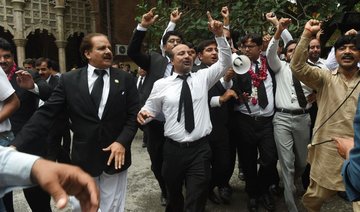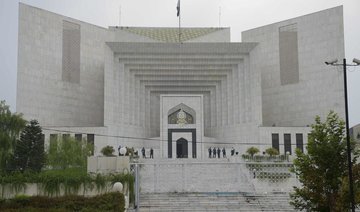ISLAMABAD: Pakistan’s Prime Minister Nawaz Sharif was Friday ousted from the top office by the Supreme Court, but as the head of the ruling Pakistan Muslim League-Nawaz party he will be able to nominate his successor.
Sharif’s chosen candidate will be put to a vote in the National Assembly — a rubber stamp affair as the PML-N holds a strong majority in the house.
His daughter Maryam Nawaz is commonly touted as his political heir, but she does not currently hold elected office so cannot be a candidate this time around.
Pakistani politics often see dark horses emerge, but the most likely candidates for the country’s next prime minister are as follows:
Shahbaz Sharif
Speculation within the vocal local media suggests that the party is planning to bring in an interim prime minister for a few weeks before electing Sharif’s younger brother Shahbaz Sharif to the post.
The young Sharif is currently chief minister of powerful Punjab province — the Sharif family stronghold. He would have to step down from that role and be elected to the National Assembly before he was eligible to become prime minister.
That will require a party loyalist to resign from his seat in the national parliament, sparking a hasty vote that Shahbaz would contest on the PML-N ticket.
Shahbaz is considered more intelligent but less charismatic than his older brother.
He has controlled Punjab — Pakistan’s most populous and prosperous province — for much of the last decade, presiding over a series of big ticket infrastructure projects, including Pakistan’s first metro bus service.
Khawaja Asif
Defence Minister Khawaja Asif is one of the most trusted allies of the outgoing prime minister and considered the mostly likely to succeed him.
The former banker has held a series of key positions within the PML-N since 1991. He was elected to the National Assembly from his home district of Sialkot — an important manufacturing centre in Punjab province — since 1993.
He is viewed as a strong critic of the powerful military and commentators say that his hardline stance against the army has created problems for Sharif.
Sardar Ayaz Sadiq
The speaker of the National Assembly Sardar Ayaz Sadiq is another strong candidate for next prime minister who is said to have the ear of the ruling Sharif family.
Sadiq gained Sharif’s trust after he defeated the PML-N leader’s main rival, cricketer-turned-politician Imran Khan, in a hotly contested race for a Lahore seat in the 2013 general election.
Sadiq lost the seat two years later following allegations of vote rigging, only to be re-elected in a by-election, narrowly beating another close aide of Khan. He was restored as the speaker after his re-election.
Sadiq began his political career as a supporter of Khan’s Pakistan Tehreek-i-Insaaf party, but quit to contest the 2002 elections on a PML-N ticket.
Ahsan Iqbal
A US-educated lawmaker, Ahsan Iqbal hails from a political family that has long been associated with Sharif’s PML-N party.
Iqbal is considered the development brains of the party and a visionary leader.
He currently heads the federal planning and development ministry, having previously served as minister for education and minorities. He has also worked as deputy chairman of the Planning Commission from 1998 to 1999 during Sharif’s second term.
Chaudhry Nisar Ali Khan
Interior Minister Chaudhry Nisar Ali Khan, a stalwart of the PML-N, was until recently considered the prime candidate to succeed Sharif.
But relations between the two have recently cooled, with some sources suggesting that Sharif is concerned that the vocal Nisar could be positioning himself to wrest control of the party from the embattled prime minister.
Speculation this week that he could be about to resign his seat has heightened the intrigue surrounding his relationship with Sharif.
Unlike Sharif’s other key allies, Nisar has close ties with the powerful military, often serving as broker between the two — a relationship that would serve Nisar well if he decided to make an independent bid for the top office.
















